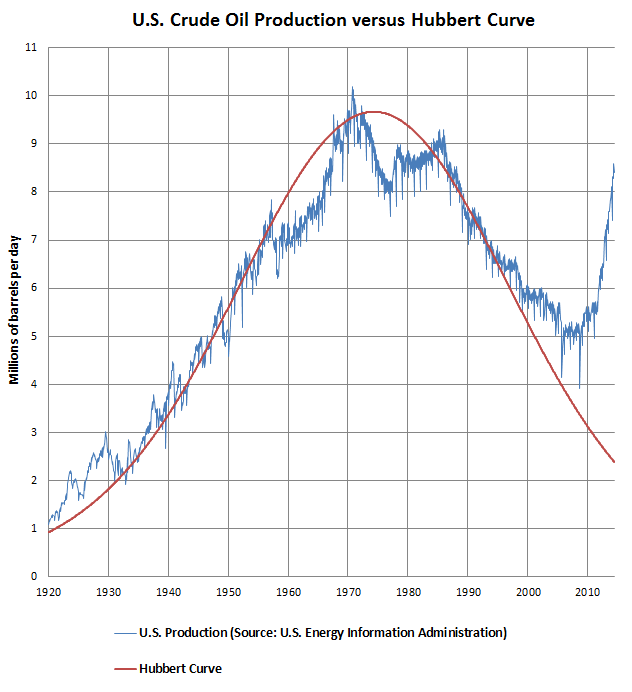
We all have heard about this so called global warming. Apparently it’s true. Scientifically a fact. But it doesn’t necessarily mean we need to cut back our gas guzzling ways or make the government invest in alternative energy. Why not? Peak oil theory.
The United States used to dominate the world market for oil (and thus gasoline) – no, I’m not talking about the demand for oil, I’m talking about the production! The US had tons of oil – Texas, Pennsylvania, California – and the rest the world had a mere pittance. But in 1956 a man named M. King Hubbert predicted these good times would come to an end within 15 years.
He noticed that every oil well and field shared a similar timeline – first discovery, the logistics to extract the oil being put in place, a peak or plateau of production, followed by a decline. In the US he noticed the decline took place 32 to 35 years after the discovery. Armed with this information he analyzed all the oil fields in the US and predicted US oil production would peak between 1965 and 1970. And wouldn’t you know it, US oil production hit its peak in 1970. By 1973 gas prices skyrocketed, which led to the government enforcing rations and artificially setting prices.

This history lesson can also be applied to today’s global oil production market. When you do this analysis, we are dangerously close to the peak. This year could be when the most oil is pumped out the ground or it could be 5 or 10 years from now. It’s hard to predict exactly, but a decline is inevitable according to peak oil theory. Oil is getting harder to find and reach. The low hanging fruit is all gone. Even though there is a lot of oil left underground, it won’t do us much good – if we started drilling now, the flow rate won’t come close to sating demand and at some point it will become cost prohibitive.
Let’s zoom out and imagine both huge problems: global warming and peak oil. Do they cancel each other out? Will the world really keep warming if we run out of oil to warm it? Does peak oil theory tell us not to worry about global warming? Even if you believe in peak oil theory, doesn’t it just seam irresponsible to not do anything about global warming? Won’t it make things a lot smoother if we can identify excellent alternative energy options before we are forced to use them?
Credit Mr. Thiel’s lecture on energy this week for introducing me to this idea (some quick googling shows many people are interested in this). There are so many nuggets of wisdom that pour out of his mouth, it’s hard to pick just one to write about!

The worrisome parts are the follow-on effects to atmospheric/oceanic warming. Human-liberated hydrocarbons are just one element… people have been harping on deforestation as another vicious cycle component for decades (fortunately, we’ve done a decent job of managing our forests in North America, anyway…)
What happens if slight temperature effects shift system dynamics… oceanic flow pattern shifts, the unlocking of “frozen” methane hydrates in the arctic seabed… all of these outcomes are terrifying.
But it remains to be seen whether they are credible.
Peak oil theory seems to be bearing out, but doesn’t in any way counteract the potential environmental catastrophes we could face in the near future. And the other huge problem is, no “alternative energy solutions” are that easy to find. It turns out it’s pretty hard to make electrons and make big metal things move. It’s either hard on the environment because things are too damn efficient at exploding into energy, or it’s hard on our wallets because things aren’t efficient enough, or both.
I’m going to go drink a beer.
It is complex, but there need to be 1-2 key things that people can focus on – beyond that we are just weakening the argument. You go drink a beer, you earned it!